初中英语学习常见错误一览表M人教新目标版
七年级下册英语人教版易错点
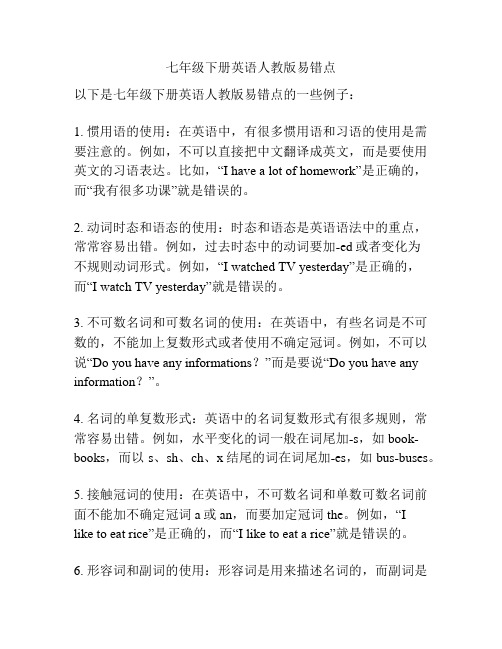
七年级下册英语人教版易错点以下是七年级下册英语人教版易错点的一些例子:1. 惯用语的使用:在英语中,有很多惯用语和习语的使用是需要注意的。
例如,不可以直接把中文翻译成英文,而是要使用英文的习语表达。
比如,“I have a lot of homework”是正确的,而“我有很多功课”就是错误的。
2. 动词时态和语态的使用:时态和语态是英语语法中的重点,常常容易出错。
例如,过去时态中的动词要加-ed或者变化为不规则动词形式。
例如,“I watched TV yesterday”是正确的,而“I watch TV yesterday”就是错误的。
3. 不可数名词和可数名词的使用:在英语中,有些名词是不可数的,不能加上复数形式或者使用不确定冠词。
例如,不可以说“Do you have any informations?”而是要说“Do you have any information?”。
4. 名词的单复数形式:英语中的名词复数形式有很多规则,常常容易出错。
例如,水平变化的词一般在词尾加-s,如book-books,而以s、sh、ch、x结尾的词在词尾加-es,如bus-buses。
5. 接触冠词的使用:在英语中,不可数名词和单数可数名词前面不能加不确定冠词a或an,而要加定冠词the。
例如,“Ilike to eat rice”是正确的,而“I like to eat a rice”就是错误的。
6. 形容词和副词的使用:形容词是用来描述名词的,而副词是用来描述动词、形容词或者其他副词的。
容易混淆的地方是如何转换形容词和副词的形式。
例如,形容词good对应的副词是well,而不是goodly。
以上只是一些七年级下册英语人教版易错点的例子,还有很多其他的内容可能会出错。
建议学生在学习英语时要多多练习,加强对这些易错点的掌握和理解。
另外,老师可以针对这些易错点进行有针对性的讲解和练习。
初中英语知识点归纳常见错误总结和纠正方法

初中英语知识点归纳常见错误总结和纠正方法一、词汇知识点1.名词单复数错误错误:The childs are playing in the park.纠正:The children are playing in the park.2.动词时态错误错误:I go to school yesterday.纠正:I went to school yesterday.3.形容词和副词使用错误错误:She drives careful.纠正:She drives carefully.4.介词用法错误错误:I'm good in play basketball.纠正:I'm good at playing basketball.二、语法知识点1.主谓一致错误错误:The book that I borrowed from the library are interesting.纠正:The book that I borrowed from the library is interesting.2.冠词使用错误错误:I want to buy a book for my sister.纠正:I want to buy the book for my sister.3.句子结构错误错误:Although raining, but we still went to the park.纠正:Although it was raining, we still went to the park.4.直接间接引语错误错误:She said that "I am happy".纠正:She said, "I am happy."三、阅读理解1.字面理解错误错误:The passage says that the Earth goes around the Sun.纠正:The passage says that the Sun goes around the Earth. 2.推理判断错误错误:According to the passage, all birds can fly.纠正:According to the passage, not all birds can fly.3.细节理解错误错误:The passage mentions that the boy is 15 years old.纠正:The passage mentions that the boy is 12 years old.四、写作表达1.时态使用错误错误:I will go to the beach yesterday.纠正:I went to the beach yesterday.2.句子逻辑错误错误:I like swimming because it's good for your health and fun.纠正:I like swimming because it's good for your health and enjoyable.3.词汇搭配错误错误:She eats a lot of hamburgers every day.纠正:She eats a lot of hamburgers every week.五、听力技巧1.辨认单词错误错误:She said "really" instead of "rarely".纠正:She said "rarely" instead of "really".2.理解句子意思错误错误:The speaker said she likes cats, but she actually likes dogs.纠正:The speaker said she likes cats, and she actually likes cats.六、口语表达1.语音语调错误错误:He speaks English with a strong Chinese accent.纠正:He speaks English with a strong British accent.2.用词不准确错误:He said that he is very "interesting".纠正:He said that he is very "interested".七、补充错误类型1.拼写错误错误:She wants to vist her friend.纠正:She wants to visit her friend.2.标点符号使用错误错误:I'm happy纠正:I'm happy!3.书写规范错误错误:My name is john.纠正:My name is John.在学习初中英语的过程中,我们经常会犯一些错误。
人教版七年级英语易错知识点归类例析+七年级英语下册-unit7、8易错题汇总

人教版七年级英语易错知识点归类例析+七年级英语下册-unit7、8易错题汇总英语有很多很细小的知识点,而这些细小的知识点往往就是考点。
同学们很容易由于注意不到而犯错误,下面就初一年级同学们比较容易犯错误的知识点做一个汇总。
1. 这些女老师们在干什么?[误] What are the woman teachers doing?[正] What are the women teachers doing?[析] 在英语中,当一名词作定语修饰另一名词(单或复数形式)时,作定语的名词一般要用其单数形式;但当man,woman作定语修饰可数名词复数形式时,要用其复数形式men,women.2. 房间里有多少人?[误] How many peoples are there in the room?[正] How many people are there in the room?[析] people作“人、人们”解时,是个集合名词,其单复数同形。
3. 我想为我儿子买两瓶牛奶。
[误] I want to buy two bottle of milk for my son.[正] I want to buy two bottles of milk for my son.[析] 表示不可数名词的数量时,常用“a / an或数词+表量的可数名词+ of + 不可数名词”这一结构,其中当数词大于1时,表量的可数名词要用其复数形式。
4. 你妹妹通常什么时候去上学?[误] What time does your sister usually goes to school?[正] What time does your sister usually go to school?[析] 借助助动词do(或does)构成疑问句或否定句时,句中的谓语动词用其原形。
5. 琳达晚上经常做作业,但今晚她在看电视。
[误] Linda often do her homework in the evening,but this evening she watching TV.[正] Linda often does her homework in the evening,but this evening she is watching TV.[析] 在初一英语学习阶段,我们接触到了两种主要时态:一般现在时和现在进行时。
九年级全册Unit7易错考点专练人教新目标版
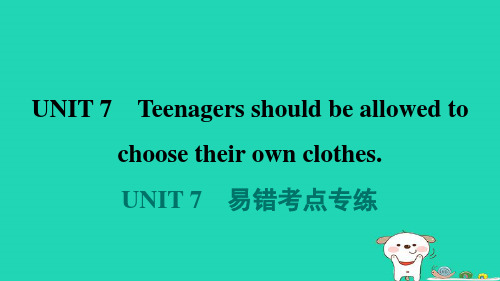
二、完成句子。 4. 雨季期间,不应该允许有人在这条河里游泳。
No one should be allowed to swim in the river during the
wet season. 5. 博物馆里不允许吸烟。
Smoking isn’t allowed in the museum.
二、单项选择。
Байду номын сангаас
( C )5. My brother has been in the army, but he has never
regretted
his own decision.
A. to make
B. not to make
C. making
D. not making
allow sb. to do sth. / allow doing.sth. / sb. be allowed to do sth.辨析 易错点津:allow的常见用法: allow sb. to do sth.允许某人
he didn’t finish his homework.
3. —Did you sleep well last night? —No, I argued with my mother and I regretted talking . (talk) back to her.
4. Jim regretted not seeing (not see) the movie with his friend last night.
还没有做,常用于一般现在时。2. regret doing sth.表示后 悔做过某事,此时事情已经做过。
一、用括号内所给词的适当形式填空。 1. I regret to inform (inform) you that you didn’t pass the
九年级:中学生英语学习常见错误一览表4(教学方案)
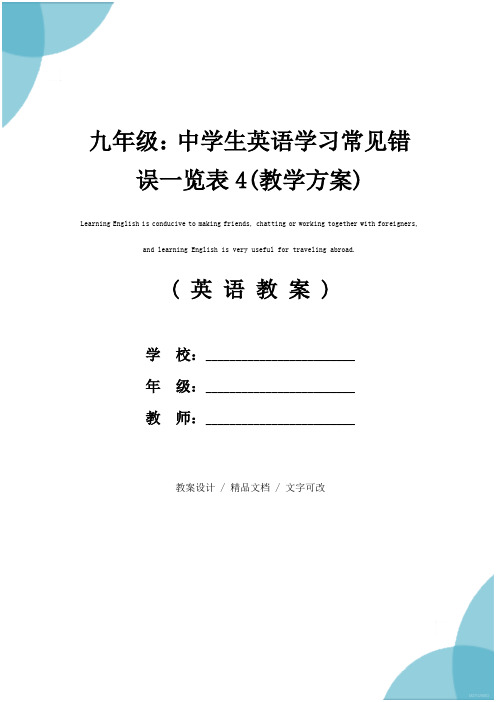
( 英语教案 )学校:_________________________年级:_________________________教师:_________________________教案设计 / 精品文档 / 文字可改九年级:中学生英语学习常见错误一览表4(教学方案)Learning English is conducive to making friends, chatting or working together with foreigners, and learning English is very useful for traveling abroad.九年级:中学生英语学习常见错误一览表4(教学方案)教材简介:学习英语有利于和外国人交朋友,聊天或者一起工作,本教学设计资料适用于初中九年级英语科目,学习本教材的学生可以提高自身技能,本文档是按照教材进行修订编写,可以放心的进行教材使用。
join[误] did you attend the football club?[正] did you join the football club?[析] join经常用于参加某个团体、政党,并作为其中的一个成员;attend则重点强调出会议、到场,而不一定进行具体活动,如: did you attend the meeting yesterday?而take part in则强调参与某些具体活动或运动,如: i take part in the football game.just[误] i have finished my work just now.[正] i finished my work just now.[析] just now意义"刚才",所以句中的谓语动词要用过去式。
[误] just i won the game.[正] i just won the game.[析] just单独使用时不应放在句首,而应放于① be动词之后,如: he is just a student.②名词与一般动词之间。
七年级英语上册错误知识点

七年级英语上册错误知识点英语学习的过程中,难免会出现一些错误。
了解一些常见错误知识点,可以帮助我们更好地学习和掌握英语。
下面列举七年级英语上册中一些常见的错误知识点。
一、时态错误1. 不使用正确的时态:有时我们在描述过去的事件时会把动词时态弄错。
比如:“Last night I go to bed very late.” 这个句子应该改为:“Last night I went to bed very late.”2. 混淆时态:有些学生容易在描述与将来有关的事件时,使用过去时态。
比如:“Tomorrow I played basketball with my friend.”这个句子应该改为:“Tomorrow I will play basketball with my friend.”二、冠词错误1. 误用不定冠词:不定冠词a/an表示“一”,只能用于单数名词前。
例如:“I saw a elephant in the zoo.” 这个句子应该改为:“I saw an elephant in the zoo。
”2. 误用定冠词:定冠词the表示特指,只能用于特定的事物或人。
有些学生在表达泛指时,错误地使用了定冠词the。
例如:“The students like music.” 这个句子应该改为:“Students like music.”三、词性错误1. 名词变形错误:有些学生在将名词变为动词时,只是在词尾加ed或ing。
例如:“I have much fun when playing basketball.” 这个句子应该改为:“I have much fun when I play basketball.”2. 形容词变形错误:有些形容词没有比较级和最高级形式,但有些学生仍然在试图使用不可能的比较和最高级形式。
例如:“This is the funniest joke I’ve ever heard.” 这个句子应该改为:“This is a funny joke.”四、介词使用错误1. 错误的介词:有些学生在使用介词时会用错。
初中英语人教版八年级上册单元易错点汇总(1-4单元)

八年级英语上册单元易错点汇总Unit 11.不定代词:(1)either ...or ...、neither ...nor ...就近原则(2)each和every的区别:each of,every one of(3)none和nobody的区别:none of,nobody后不能加of(4)other系列(5)复合不定代词,单拼想不到2.反身代词:yourself,yourselves3.长句子时态容易填错4.feel like doing sth,would like to do sth,would rather do sth5.keep diaries,dairy忘记变复数6.介词on、above、over的区别7.have nothing to do but do8.表示建议的句型:(1)Why not do sth?(2)Why don't you do sth?(3)What/How about doing sth?(4)Would you like to do sth?(5)Let's do sth.9.seem首次出现,系动词,seem后的搭配,完型、单拼常考10.difference可数,注意加s11.enough一词多性:放于名词之前,形容词和副词之后12.ed形容词和ing形容词的区别,注意:the most exciting magician13.decide和decisionUnit 21.四个“花费”2.up短语:wake up、stay up、get up、dress up、make up、put up、bring up等3.be afraid to do/of doing4.get good grades注意grade加s5.mind一词多性:n.make up one's mind to do sthv.mind one's doing sth6.频度副词:seldom=hardly几乎不(否定含义),almost几乎(肯定含义)7.次数、倍数:once、twice、three times8.be full of和be filled with9.result一词多性n.Here are the results of ...,result用复数as a result和as a result of的区别v.result in=lead to10.although、though和through11.die、died、dead、dying、death 、die of12.point一词多性,point to和point at13.percent不加s14.the Internet,定冠词the,首字母I大写15.swing一词多性,单拼常考16.however完型填空常考17.magazine单拼加s18.积累谚语Unit 3& Unit 4一、语法部分:形容词&副词比较级和最高级1、变化规则和不规则变化:注意重读闭音节和多音节;不规则变化2、用法:比较级注意加the的用法和修饰比较级的词;原级注意as...as这个结构和其否定形式最高级注意三个结构的用法3、倍数表达法4、最高级后接of/ in的用法二、句型结构1、It’s +adj./ adv.+for / of sb to do sth 注意for 和of 的选择2、As long as/ as soon as / if / when的意思和主从句的时态三、单词1、truly注意单词拼写2、care for/ about3、reach for4、play a role/ part in5、poor的意思6、be crowded with7、heavy 形容交通和雨雪8、be up to 取决于9、pretty作为副词10、close的词性/ closed11、see / hear/ watch sb do/ doing sth12、keep / make sth.+adj.13、keep (on) doing14、let/ make / have sb do sth15、like 两种词性,对应的反义词分别为dislike 和unlike16、serious & seriously take sth.Seriously17、综合复习职业的单词;复习第四单元的不规则动词过去式注意:一词多性的用法。
中学生英语学习常见错误一览表

中学生英语学习常见错误一览表中学生英语学习常见错误一览表与[误].[正].[析]在不定冠词与的用法中要注意的一点是:用在以元音开头的词之前;而则用在以辅音开头的词之前。
要特别注意的是以字母打头的单词,如等,其第一个音标是[],所以要特别予以注意。
[误].[正].[析]要注意和的第一个字母不发音。
[误], .[正], .[析]要注意以打头的单词,它的发音为[]时,单数名词前要用,如等。
[误]“”“”.[正]“”“”.[析]英文字母单独使用时,如其第一个发音是元音时,其前面的不定冠词应该用而不是.[误]. .[正]. .[析]要注意这些字母的第一个发音为元音,如 , 等。
与[误].[正].[析]主要表达某事或某人具有某种能力去作某事,应译为“有本领”、“有能力”、“可以”作某事,如:' . 而可以用来表示具有接受能力或吸收能力。
如:.[误].[正].[析]要注意是“将要”的意思,含有将来时之意,不要与表示过去时的时间状语连用。
另外,一般用作书面语,对应的口语是. ,与都可以作"关于"讲,但却有所不同,例如: . 应译为“这是一本关于物理学的科普读物。
”而: . 则应译为“这是一本物理学方面的专著。
”[误].[正].[析]表达“在……上方”时,与是可以互换的,如: ( ) . 但是要表达在垂直方向上的上方时则应用不可用,如:.[误].[正].[析]当表达覆盖之意时,只可用而不能用 .[误].[正].[析]用来表达“从……上方越过”时不能用只能用,如: . 但要注意 . 则应译为“在桥的上游有一个瀑布。
”[误].[正].[析]是指某一动作在一平面内进行,而则是指该动作在一三维立体空间的运动过程。
如: . .的主要用法有两个。
其一,意为“对面”,如: . 其二,意为“横过”,如:.[误]' .[正].[析]要注意“害怕”一词在英语中不是动词,而是形容词,要与动词连用。
[误].[正].[正].[析]要表达“在多少时间之后”,英语中有两种表达法,即:用时,要时间在前,如 ; 而用时要时间在后,如。
中学生英语学习常见错误一览表

中学生英语学习常见错误一览表 3 eeach[误]every of them has his habit.[正]each of them has his habit.[析]each可以作形容词,但也可作代词,而every 只能作形容词。
[误]the manager comes to america almost each month.[正]the manager comes to america almost every month.[析]each与every都作形容词讲时,都有"每个"之意,但有不同。
each多指个体,而every那么多指整体。
如:we want every student to succeed. each不同来表达总体概念,所以不能与almost, nearly,likely 等词连用。
[误]we each has a book.[正]we each have a book.[析]each 作同位语时,其数应与其同位的名词一样,而each作主语时那么应取其单数形式。
each other one anothereach other与one another这两个词组的区分在许多语法书中强调each other是两者之间,而one another是多者之间,其实不然,如:all students must care for each other, must love and help each other. 事实上这两个词组是同义的,假如要讲有什么区分的话,当我们特别笼统地谈,而不特指什么人时,多用one another.early[误]could you come here more early?[正]could you come here earlier?[析]单音节和少数双音节副词的比拟级和最高级要用er和est来作其结尾,如fast, soon, early, hard, long, near等。
九年级英语人教易错知识点
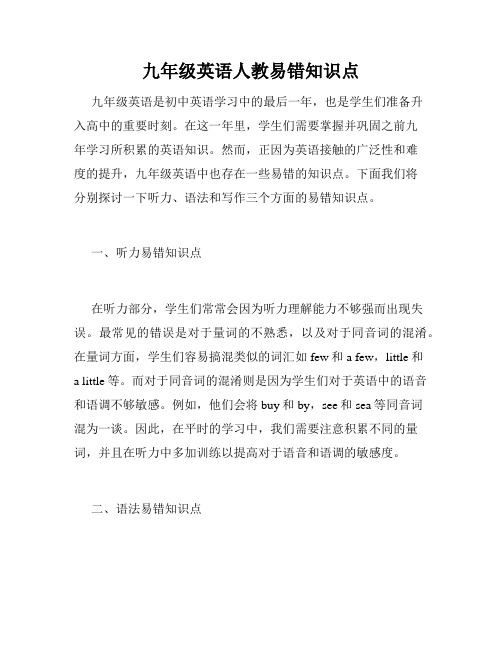
九年级英语人教易错知识点九年级英语是初中英语学习中的最后一年,也是学生们准备升入高中的重要时刻。
在这一年里,学生们需要掌握并巩固之前九年学习所积累的英语知识。
然而,正因为英语接触的广泛性和难度的提升,九年级英语中也存在一些易错的知识点。
下面我们将分别探讨一下听力、语法和写作三个方面的易错知识点。
一、听力易错知识点在听力部分,学生们常常会因为听力理解能力不够强而出现失误。
最常见的错误是对于量词的不熟悉,以及对于同音词的混淆。
在量词方面,学生们容易搞混类似的词汇如few和a few,little和a little等。
而对于同音词的混淆则是因为学生们对于英语中的语音和语调不够敏感。
例如,他们会将buy和by,see和sea等同音词混为一谈。
因此,在平时的学习中,我们需要注意积累不同的量词,并且在听力中多加训练以提高对于语音和语调的敏感度。
二、语法易错知识点九年级英语中的语法知识点相对较多,学生们往往会在使用时出现一些易错的情况。
其中最常见的错误是动词的时态和语态。
在时态方面,学生们往往会将过去时和现在完成时混淆,以至于造成语句的混乱。
同样,在语态的使用中,学生们也容易出现被动与主动混淆的情况,导致句子的意思模糊不清。
因此,在语法的学习中,我们可以通过大量的练习和积累,以及查找相关的语法知识书籍进行辅助学习。
三、写作易错知识点在写作方面,学生们常常会因为词汇量和句式的限制而出现易错的情况。
他们往往只会使用一些常用的词汇和简单的句式,导致文采的匮乏。
此外,学生们也常常忽略了对于语法错误的检查,因此在写作中容易出现语法错误。
为了解决这些问题,我们可以通过增加阅读量来扩大自己的词汇量,并且多积累一些高级的词汇和句式。
同时,在写作过程中,我们也应该重视语法的正确使用,并在完成后对文章进行一次仔细的检查。
总结起来,九年级英语中的易错知识点主要集中在听力、语法和写作三个方面。
学生们容易因为对于量词不熟悉,对于同音词混淆而出现失误。
中考英语复习:人教版中学生阶段英语学习常见错误一览表

中学生英语学习常见错误一览表Aa[误] I think it is an useful English dictionary.[正] I think it is a useful English dictionary.[析]在不定冠词a与an的用法中要注意的一点是:an用在以元音开头的词之前;而a则用在以辅音开头的词之前。
要特别注意的是以u字母打头的单词,如useful,university等,其第一个音标是[j],所以要特别予以注意。
[误] I need a hour to finish this letter.[正] I need an hour to finish this letter.[析]要注意hour和honest的第一个字母不发音。
[误] My teacher is a unknown man, but he is a very good man.[正] My teacher is an unknown man, but he is a very good man.[析]要注意以u打头的单词,它的发音为[]时,单数名词前要用an,如uncle等。
[误] There is a "f" in the word "football".[正] There is an "f" in the word "football".[析]英文字母单独使用时,如其第一个发音是元音时,其前面的不定冠词应该用an而不是a.[误] I have a little brother. He is a 8year old boy.[正] I have a little brother. He is an 8year old boy.[析]要注意这些字母的第一个发音为元音,如eight, eleven等。
able[误] This bike is able to be repaired.[正] This bike can be repaired.[析] be able to 主要表达某事或某人具有某种能力去作某事,应译为"有本领"、"有能力"、"可以"作某事,如:I'm able to swim across this river. 而can可以用来表示具有接受能力或吸收能力。
2023-2024学年人教版七年级英语上册关于单词、短语、句子常见错误纠错
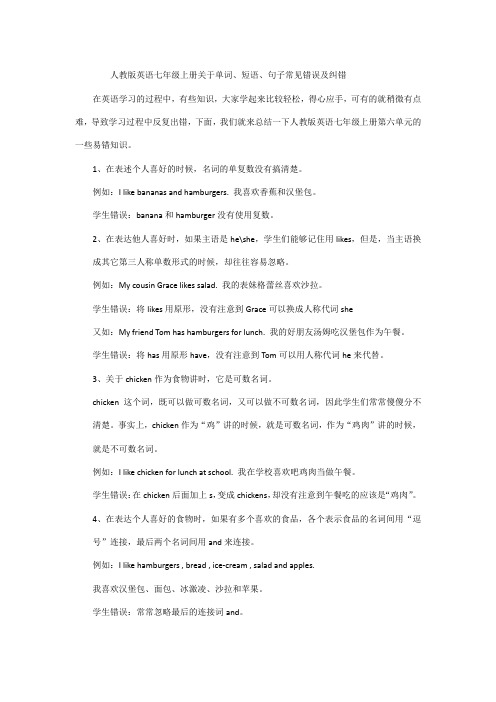
人教版英语七年级上册关于单词、短语、句子常见错误及纠错在英语学习的过程中,有些知识,大家学起来比较轻松,得心应手,可有的就稍微有点难,导致学习过程中反复出错,下面,我们就来总结一下人教版英语七年级上册第六单元的一些易错知识。
1、在表述个人喜好的时候,名词的单复数没有搞清楚。
例如:I like bananas and hamburgers. 我喜欢香蕉和汉堡包。
学生错误:banana和hamburger没有使用复数。
2、在表达他人喜好时,如果主语是he\she,学生们能够记住用likes,但是,当主语换成其它第三人称单数形式的时候,却往往容易忽略。
例如:My cousin Grace likes salad. 我的表妹格蕾丝喜欢沙拉。
学生错误:将likes用原形,没有注意到Grace可以换成人称代词she又如:My friend Tom has hamburgers for lunch. 我的好朋友汤姆吃汉堡包作为午餐。
学生错误:将has用原形have,没有注意到Tom可以用人称代词he来代替。
3、关于chicken作为食物讲时,它是可数名词。
chicken这个词,既可以做可数名词,又可以做不可数名词,因此学生们常常傻傻分不清楚。
事实上,chicken作为“鸡”讲的时候,就是可数名词,作为“鸡肉”讲的时候,就是不可数名词。
例如:I like chicken for lunch at school. 我在学校喜欢吧鸡肉当做午餐。
学生错误:在chicken后面加上s,变成chickens,却没有注意到午餐吃的应该是“鸡肉”。
4、在表达个人喜好的食物时,如果有多个喜欢的食品,各个表示食品的名词间用“逗号”连接,最后两个名词间用and来连接。
例如:I like hamburgers , bread , ice-cream , salad and apples.我喜欢汉堡包、面包、冰激凌、沙拉和苹果。
学生错误:常常忽略最后的连接词and。
初中英语人教新目标七年级下册Unit 1- Unit 3 高频易错点讲解和练习

七年级英语下册高频易错点讲解练习Unit 1一、speak,tell,talk,say的用法speak: 讲语言,强调说的动作,不强调内容;➡speak to sb.about sth.➡speak+ 某种语言tell: 告诉,及物动词,接双宾语,➡tell sb.sth.=tell sth.to sb.➡tell sb.to do sth.say: 说,及物动词,强调言语内容➡say sth.to sb.talk: 交谈,聊天,不及物动词➡talk to sb., talk with sb.,【练习】1.Mr.Wu wants to_____to his son.2.Jenny and Mary are good at_______English.3.She_________us interesting stories.4.Our teacher often______us to go to school early.5.My teacher often_____she can play chess.【答案】1.talk/ speak2.speaking3.tells4.tell5.say二、be good at, be good with,be good for的用法be good at:擅长,与do well in可以同义替换be good with: 善待,与...相处好,善于应付...的be good for: 对...有益,对应短语be bad for(对...有害)【练习】1.---Are you good_______your students? ---Yes, I am.A.atB.withC.forD.of2.Tom is good_______speaking English.A.atB.withC.forD.of3.Vegetables and fruit are good_______us.A.atB.withC.forD.of【答案】1.B2.A3.C三、can的用法①情态动词,后接动词原形,没有人称和数的变化②否定句直接在can后加not, can not=can't, 疑问句把can放到句首③过去式为could1.My brother_______the trumpet and he plays it_____.A.can play; goodB.can't play; goodC.can play;wellD.doesn't play; well2.---Hi,can I help you?---________.A.Yes,pleaseB.No,I can'tC.Yes,I canD.You're welcome3.Tom can swim.(改为一般疑问句,并作肯定、否定回答)______Tom_______?______, _____ ______.______, _____ ______.4.Lucy and Lily can dance and sing.(改为否定句)Lucy and Lily ______dance_______sing.【答案】1.C2.A3.Can/ swim/ Yes, he can./ No , he can't.4.can't/ or四、play的用法①后接游戏,球类运动,棋牌,不加the②后接乐器,要加the关于【拉二胡】,教材给的是play the erhuplay sports 做运动, sports用复数【练习】1.他喜欢玩电脑游戏。
中学生英语学习常见错误一览表5
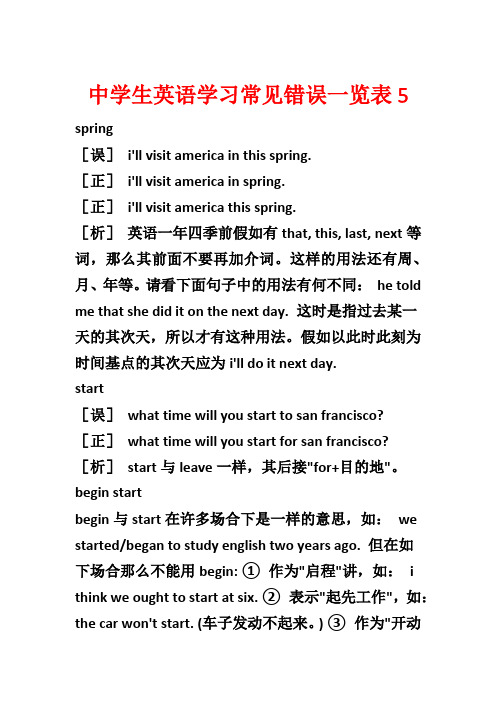
中学生英语学习常见错误一览表5 spring[误]i'll visit america in this spring.[正]i'll visit america in spring.[正]i'll visit america this spring.[析]英语一年四季前假如有that, this, last, next等词,那么其前面不要再加介词。
这样的用法还有周、月、年等。
请看下面句子中的用法有何不同:he told me that she did it on the next day. 这时是指过去某一天的其次天,所以才有这种用法。
假如以此时此刻为时间基点的其次天应为i'll do it next day.start[误]what time will you start to san francisco?[正]what time will you start for san francisco?[析]start与leave一样,其后接"for+目的地"。
begin startbegin与start在许多场合下是一样的意思,如:we started/began to study english two years ago. 但在如下场合那么不能用begin: ① 作为"启程"讲,如:i think we ought to start at six. ② 表示"起先工作",如:the car won't start. (车子发动不起来。
) ③ 作为"开动"、"启动"讲,如:do you know how to start this machine.still[误]oh, it is still raining now.[正]oh, it is still raining.[析]因still即包含有此时此刻仍旧如何,所以now 是多余词。
七年级下册英语人教版易错点
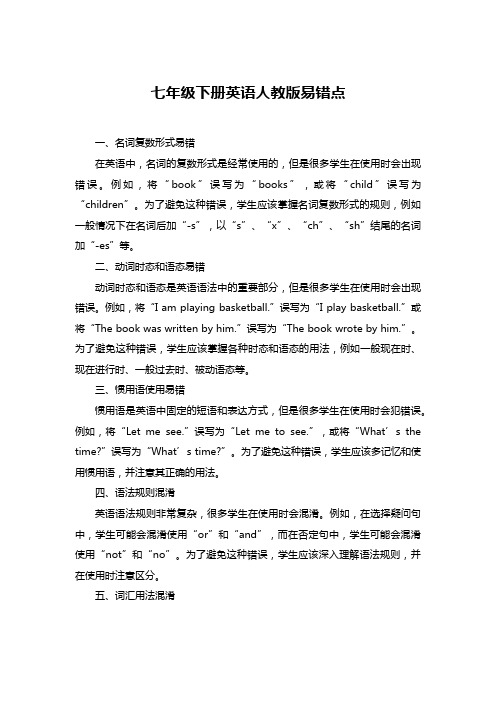
七年级下册英语人教版易错点一、名词复数形式易错在英语中,名词的复数形式是经常使用的,但是很多学生在使用时会出现错误。
例如,将“book”误写为“books”,或将“child”误写为“children”。
为了避免这种错误,学生应该掌握名词复数形式的规则,例如一般情况下在名词后加“-s”,以“s”、“x”、“ch”、“sh”结尾的名词加“-es”等。
二、动词时态和语态易错动词时态和语态是英语语法中的重要部分,但是很多学生在使用时会出现错误。
例如,将“I am playing basketball.”误写为“I play basketball.”或将“The book was written by him.”误写为“The book wrote by him.”。
为了避免这种错误,学生应该掌握各种时态和语态的用法,例如一般现在时、现在进行时、一般过去时、被动语态等。
三、惯用语使用易错惯用语是英语中固定的短语和表达方式,但是很多学生在使用时会犯错误。
例如,将“Let me see.”误写为“Let me to see.”,或将“What’s the time?”误写为“What’s time?”。
为了避免这种错误,学生应该多记忆和使用惯用语,并注意其正确的用法。
四、语法规则混淆英语语法规则非常复杂,很多学生在使用时会混淆。
例如,在选择疑问句中,学生可能会混淆使用“or”和“and”,而在否定句中,学生可能会混淆使用“not”和“no”。
为了避免这种错误,学生应该深入理解语法规则,并在使用时注意区分。
五、词汇用法混淆英语词汇非常丰富,但是很多学生在使用时会混淆其用法。
例如,“good”是一个形容词,但学生可能会误用为名词,将“He is a good.”误写为“He is good.”。
为了避免这种错误,学生应该掌握每个单词的词性及用法,并注意区分不同的单词和词组。
六、句型结构不正确英语句型结构有很多种,但是很多学生在使用时会犯错误。
八年级上册英语常见失误100道

八年级上册英语常见失误100道本文将介绍八年级上册英语中常见的100个错误。
供学生参考,以帮助他们在研究中避免这些错误。
词汇1. 将“I”和“my”混淆2. 将“a”和“an”混淆3. 将“there”和“their”混淆4. 无法正确使用形容词和副词5. 错误使用“much”和“many”6. 未能正确使用代词语法7. 使用错误的时态8. 将“do”和“did”混淆9. 错误的主谓一致10. 非并列连词错误使用11. 使用错误的单复数形式12. 误用代词13. 非限制性从句中缺少逗号或未使用正确的逗号14. 错误使用介词15. 在 "there is"和 "there are"的使用上犯错误拼写16. 拼写错误的基本单词17. 拼写错误的可数名词18. 拼写错误的不可数名词19. 拼写易混淆的单词20. 添加了多余的字母或省略了字母用法错误21. 错误地使用动词22. 误用形容词和副词23. 随意使用情态动词24. 错误的介词用法25. 误用同音词26. 在使用倒装语法时犯错误句子结构27. 句子结构不完整或不正确28. 没有句子的主语和谓语29. 复合句中的子句之间没有正确的标点30. 意思不明确的句子结构表达错误31. 没有正确地传达意思32. 随意切换语法33. 意思不完整或不明确34. 没有正确执行翻译35. 在单词和语法之间没有正确的关联听力和口语36. 没有正确理解听力37. 没有适当地把握口音38. 犯了通用的口语错误39. 犯了调音错误40. 犯了重读错误阅读和写作41. 阅读速度太慢42. 没有正确理解文章43. 在词汇和语法方面有困难44. 写作水平过低45. 没有写出清晰的表达语音和发音46. 没有发出正确语音47. 不能正确准确地重复单词48. 几个音节的单词发音错误49. 没有考虑到音素残留50. 犯语音重读错误数字和日期51. 多位数字写错52. 写小数形式不正确53. 使用“+”和“-”符号时写错54. 按顺序写日期出错55. 写错了24小时时间格式研究和记忆56. 难以记住单词57. 研究同音异义词时出错58. 理解混淆的词汇59. 在研究语法时陷入迷惑60. 在研究角色时有困难沟通和表达自己61. 忘记化解语法困境62. 无法自由的表达思想63. 用自己的语言思考64. 在沟通中有障碍65. 没有以合适的方式表达思想建立信心66. 没有足够的信心67. 难以理解英语文化68. 在进行口语时陷入困境69. 在听力时出现困难70. 在写作时出现困难掌握技巧71. 判断速度不够快72. 没有适当掌握基础知识73. 区分口语和一般表达74. 在研究方式上出现错误75. 研究焦虑过高学生态度76. 沉溺于中文思考77. 研究英语时不够专注78. 研究英语时缺乏兴趣79. 在研究上缺乏耐心80. 缺乏自觉性和自我驱动阅读技能81. 阅读时没有意识到上下文82. 阅读时不能准确地理解难点83. 阅读速度太慢84. 阅读理解能力差85. 阅读临考时出现紧张情绪语言表达86. 声音和语调不准确87. 口齿含糊,说话语气轻柔或刺耳88. 过度使用缩略语和别名89. 没有针对目标观众系列话题90. 在解答问题时过于迂回简单单词使用能力91. 多义词单词的使用能力差92. 不能适当使用英文翻译93. 没有为记忆单词创造合适的机会94. 难以观察单词和短语的变化95. 没有掌握时间状语从句句子结构和拼写96. 没有理解重要的句子结构97. 句子没有合理地实现转换98. 对复合句子理解不足99. 不熟悉单词拼写100. 对句子不加以注意以上是本文汇总的八年级上册英语常见的100个错误。
中学生英语学习常见错误一览表
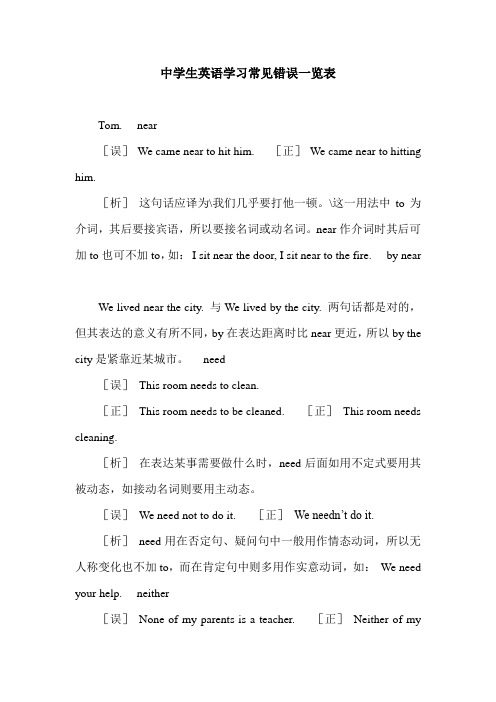
中学生英语学习常见错误一览表Tom. near[误]We came near to hit him.[正]We came near to hitting him.[析]这句话应译为\我们几乎要打他一顿。
\这一用法中to为介词,其后要接宾语,所以要接名词或动名词。
near作介词时其后可加to也可不加to,如:I sit near the door, I sit near to the fire. by nearWe lived near the city. 与We lived by the city. 两句话都是对的,但其表达的意义有所不同,by在表达距离时比near更近,所以by the city是紧靠近某城市。
need[误]This room needs to clean.[正]This room needs to be cleaned.[正]This room needs cleaning.[析]在表达某事需要做什么时,need后面如用不定式要用其被动态,如接动名词则要用主动态。
[误]We need not to do it.[正]We needn’t do it.[析]need用在否定句、疑问句中一般用作情态动词,所以无人称变化也不加to,而在肯定句中则多用作实意动词,如:We need your help. neither[误]None of my parents is a teacher.[正]Neither of myparents is a teacher.[析]对两者的否定不能用none只能用neither, none用于三人以上的情况。
[误]I don’t do my homework. Neither he does.[正]I don’t do my homework. Neither does he.[析]这时应用倒装句。
[误]Neither you nor I are right.[正]Neither you nor I am right.[析]neither…nor… 这一句型在应用时其谓语动词应以邻近的主语一致。
- 1、下载文档前请自行甄别文档内容的完整性,平台不提供额外的编辑、内容补充、找答案等附加服务。
- 2、"仅部分预览"的文档,不可在线预览部分如存在完整性等问题,可反馈申请退款(可完整预览的文档不适用该条件!)。
- 3、如文档侵犯您的权益,请联系客服反馈,我们会尽快为您处理(人工客服工作时间:9:00-18:30)。
湖北省武汉为明实验学校初中英语学习常见错误一览表M 人教新目标版Mmake[误] The little boy was made repeat the whole story.[正] The little boy was made to repeat the whole story.[误] The father made his son to do his homework from morning till night.[正] The father made his son do his homework from morning till night.[析] make 的句型为"make somebody do (doing) something".但在被动语态中原来被省去的不定式符号to要被还原回来。
[误] I always do this mistake.[正] I always make this mistake.[析]英语中do和make是十分不易弄清的两个动词,do常用于谈论工作时或某种不确定的活动时,如: do a favour(帮个忙),do one's best(竭尽全力),do g ood(有益), do harm(有害),而多数情况下常用make, 如: make a suggestion, make a cake, make a bed(收拾床),make a noise, make money 等等。
[误] This wine was made of grapes.[正] This wine was made from grapes.[析]当成品制成后,其原料的性质有所改变时应用make from,否则用make of,如: This door was made of iron.[误] Hard work can often make up a lack of intelligence.[正] Hard work can often make up for a lack o f intelligence.[析] make up是"创造"、"编织",而make up for是"弥补……的不足之处"。
上句应译为"勤奋工作可以弥补天资的不足。
"[误] We made up our mind to study hard.[正] We made up our m inds to study hard.[析] mind这里是可数名词,使用时要特别予以注意make up one's mind是"下定决心"之意。
[误] Our class is made of twenty girls and twenty one boys.[正] Our class is made up of twenty girls and twenty one boys.[析] make up of…是"某物由……组成或构成"。
many[误] I have many friends.[正] I have a lot of friends.[析] many和much多用于疑问句或否定句中,而在肯定句中则用处不多,尤其在非正式谈话中。
如:-How much money have you got?-I've got plenty.[误] You bought much too tomatoes.[正] You bought too many tomatoes.[析] too many后接可数名词,too much后接不可数名词,而much too后面接形容词,意为"太多"。
[误] For many a weeks it rained a lot.[正] For many a week it rained a lot.[析] many a意为"好多"、"许多",但其后面要加单数名词。
matter[误] No matter what you did.[正] No matter what you did, I trusted you.[析] No matter是个词组,意为"不论",它的语法功能是起连接作用,所以不能用于一个单独的句子。
it doesn't matter这个词组则不是一个连接词组,所以可以和一个单句连用,如: It doesn't mater what you say. (你说什么都不要紧。
)maybe[误] May be he is right.[正] Maybe he is right.[析] maybe是副词,不要错用为may be.maybe perhaps这两个词的词意一样,maybe常用于非正式谈话,而perhaps则多用在正式文体中。
如: Maybe/Perhaps the weather will get better. 而Julius Caesar is perhaps the greatest of Shakespeare's early plays.mend[误] I want to have my bike mended.[正] I want to have my bike repaired.[析] mend意为"缝补",如: My mother mended my coat. 而repair是"修理"。
mind[误] Could you mind to close the door?[正] Could you mind closing the door?[误] Try to make up your mind studying hard.[正] Try to make up your mind to study hard.[析] mind用作动词时,其后加动名词;而用作名词意为"下定决心"时,其后要加不定式。
要注意Do you mind if I smoke?的答语:如果你不介意,应回答"No, go ahead."如果你不想让对方吸烟,则应讲"Yes, please don't."miss[误] I found my bag missed.[正] I found my bag missing.[析] missing为形容词,其意为"不见了"、"丢了"。
在句中用作宾语补足语时不要误用missed,它作动词时多为及物动词,要接名词或动名词,而不接不定式。
如: I missed the first t rain, I don't want to miss seeing the famous football player.在作补足语讲某物"不见了"时有missing, gone, lost等,如: I found my bag missing (gone, lost).mistake[误] I took your pen by wrong.[正] I took your pen by mistake.[析] by mistake是"错拿了"、"误拿了"你的东西。
wrong意为"错误",而by mistake为"弄混了"。
如:[误] If I'm not wrong, you are Mr Brown.[正] If I'm not mistaken, you are Mr Brown. (如果我没弄错的话,您是Brown先生。
)[误] T he teachers always mistook me as my brother.[正] The teachers always mistook me f or my brother.[析] mistake…for…是"错把……当作……"之意,如: I took your book for mine.more[误] This book is more better than that one.[正] This book is much better than that one.[析]不能用比较级来修饰比较级,而应用much, rather等来修饰比较级。
[误] More you read, more you learn.[正] The more you read, the more you learn.[析]在"越……越……的"表达法中,形容词的比较级前要加定冠词。
请注意more than one这个词组的后面要跟单数名词和单数谓语动词。
如: More than one student is going to do part time job after school.no more than not morethanno more than应译为"只不过"、"才",如: He wrote no more than three books. 即他真正写了三本书。
而not more than则意为"不会多于",如: He wrote not more than three books. 即他写的书不会多于三本。
又如: He is no shorter than you. 应译为"你和他都不矮",而He is not shorter than you. 才应译为"他比你高。
"most[误] Most of students are good at English.[正] Most of the students are good at English.[正] Most students are good at English.[析] most of这一结构后面的名词前一定要有一个限定词。
[误] My friends are most teachers.[正] My friends are mostly teachers.[析] mostly意为"大部分的","主要的"。
much[误] The boy was asleep very much.[正] The boy was fast asleep.[析]不是所有的形容词都可以用very来修饰,如fast asleep意为"熟睡",则是固定搭配。
